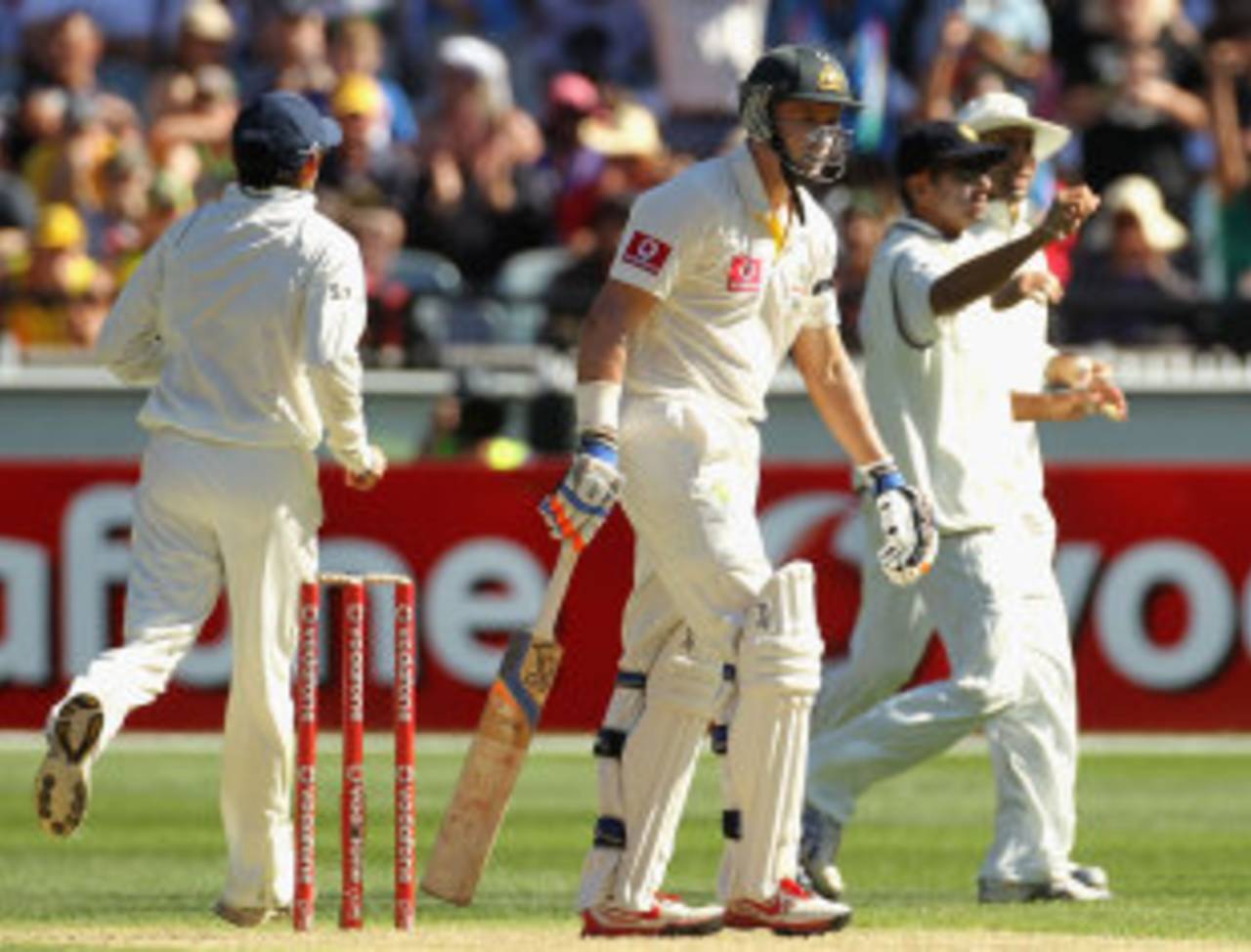Dhoni backs umpires over DRS
India will not support the DRS until they are convinced that the technology is 100% perfect, captain MS Dhoni has reiterated
Sidharth Monga in Melbourne
Dec 30, 2011, 4:54 AM

Michael Hussey would not have been dismissed for a first-innings duck had the DRS been in use • Getty Images
India will not support the DRS until they are convinced that the technology is 100% perfect, captain MS Dhoni has reiterated. Coming to Australia, India were under pressure to agree to the use of the DRS, in part because Channel 9, the host broadcasters, use some of the best technology available in their production of home Tests. However, India did not budge, and Dhoni said his experience in England, where there were several incidents that suggested Hot Spot was not completely accurate, played a part in making that call.
"I still put my money on the umpires because they have been doing the job [for a long time]," Dhoni said. "It is just that the pressure on them is growing with plenty of technology around. We feel the technology is not 100% accurate. At times you see an edge on Hot Spot, sometimes you don't see anything happening. Before the start of the England series I was a big fan of Hot Spot. The way things went in England I don't have the same kind of confidence. If it is not 100% I will still go with the umpires. This is a game in which people commit mistakes. If the bowler doesn't commit a mistake the batsman can't get runs. If the batsman doesn't commit a mistake the bowler doesn't get a wicket. So we'll make umpires too a part of it."
The DRS refused to die as a topic of debate because in the Melbourne Test there were many potentially match-turning decisions that could have been overturned had they been reviewed. Michael Hussey would not have been dismissed for a golden duck and Ed Cowan could, possibly, have continued batting in the first innings. The decision to adjudge Cowan caught-behind is an interesting grey zone with the DRS because there was a sound at the exact time the ball went past the bat but Hot Spot did not show an edge. In the past the umpires have acted just on the sound.
Ironically, It was India who could have had more decisions reversed than Australia. They could have got Ricky Ponting out early in his second innings, and they had Michael Hussey lbw twice and caught down the leg side once. It is all a matter of conjecture, but India could actually have won the match had they agreed to the use of the DRS, and used it wisely. Dhoni, though, did not want to go down that route.
"What is important is that if a mistake is committed by the umpire, it should not affect him," he said. "If as an umpire you give something out when it's not-out, you don't need to go into your shell thinking you have made a wrong decision. If the next ball the umpire feels it is out, he should boldly give the decision.
"We are happy to go that way because it is a difficult job for the umpires. We come back to our dressing-room after bowling and only two batsmen go out to bat, but these are the people who stand there for five days. Cricket has been in good shape for long enough with two people in charge. They don't need to worry too much about what technology is going around, about what will show on Hot Spot and what will show on Snicko. We need to back their decisions. If mistakes are not committed intentionally, I am perfectly fine with it."
Dhoni went on to take a dig at the numbers the ICC provides regarding the number of correct decisions made by umpires. "You'll have to see what exactly the ICC sees as correct decisions. Giving a boundary is a correct decision; that also goes in favour of the umpires. You have to categorically say this is what it is."
Dhoni's mistrust of technology would have grown when India appealed for an lbw against Brad Haddin in the first innings and the ball-tracking service failed to show a projection due to lighting issues. That was a pretty adjacent call, but India wouldn't have enjoyed the benefit of the DRS had it been in use. So even if the DRS was a part of this series we would still have had as large, if not larger, a controversy on the first day itself. Hussey would have survived, Cowan's fate would have been decided subjectively by the third umpire, and Haddin would have continued batting.
Sidharth Monga is an assistant editor at ESPNcricinfo